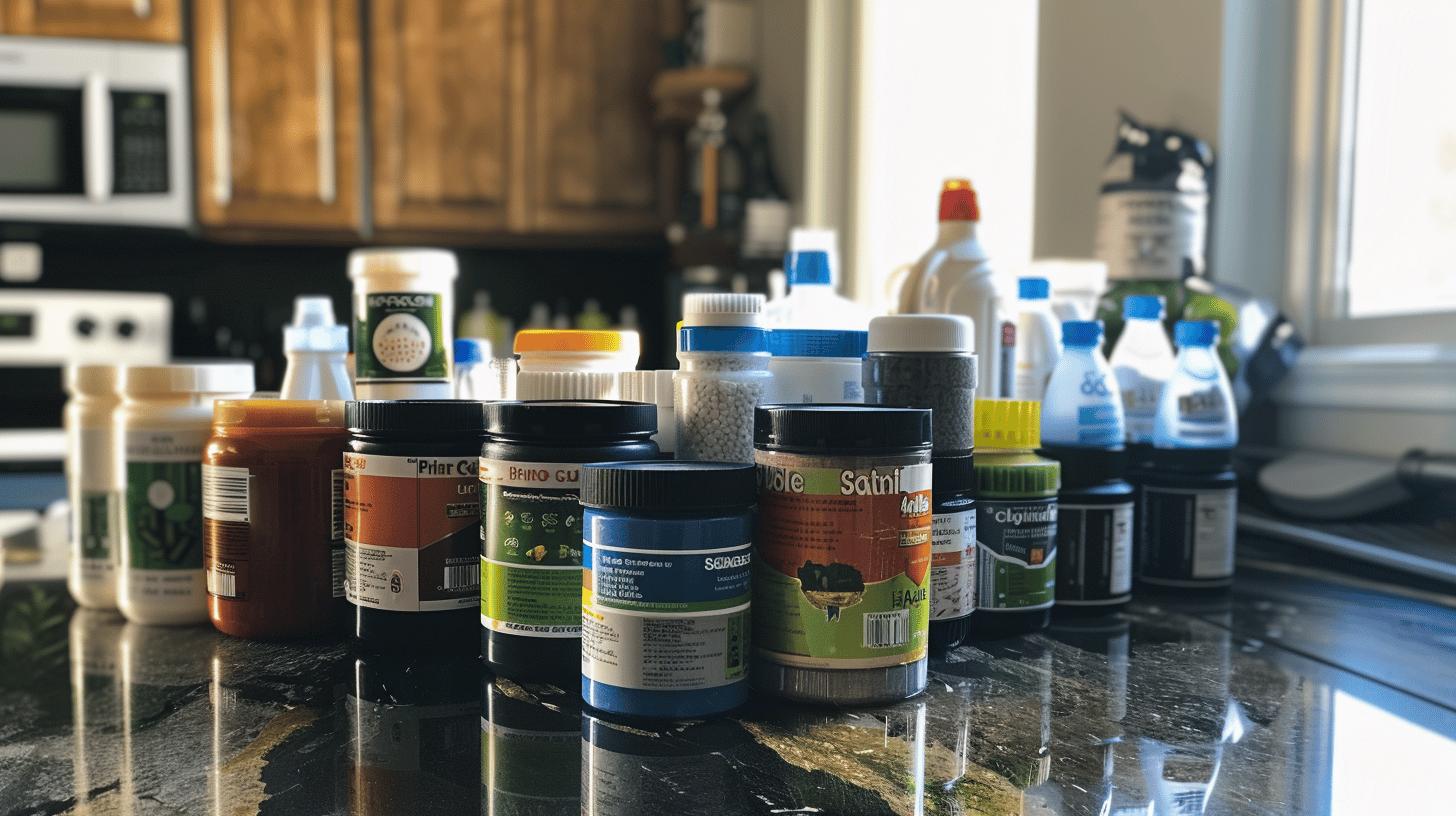Are you feeling overwhelmed by the myriad of protein powder options on the market? You're not alone. Navigating the world of protein supplements can be challenging for beginners. This article cuts through the confusion to deliver a straightforward beginner's guide to protein powder. We will examine the best options available, breaking down what protein powder is, and how it can benefit you. Ready to find the perfect protein supplement to help you achieve your fitness goals? Let's dive in.
Introduction to Beginner Protein Powder
Protein powder is a concentrated source of protein derived from animal or plant foods such as dairy, eggs, rice, or peas. It is typically consumed by mixing with water or another liquid, making it a convenient way to increase protein intake. Protein is one of three essential macronutrients, alongside fat and carbohydrates, and it plays a crucial role in body function.
For beginners, incorporating protein powder into their diet can offer several benefits. It can help maximize muscle gain, increase fat loss, and assist those who struggle to meet protein needs through food alone, such as the ill, older adults, vegetarians, and vegans.
Main reasons beginners might consider using protein powder:
- Supports muscle growth and repair
- Aids in fat loss and improves body composition
- Convenient and easy to prepare
- Helps meet daily protein requirements
- Suitable for those with dietary restrictions
Protein powders are particularly beneficial for those new to fitness or supplementation because they provide an easy and efficient way to ensure adequate protein intake. This is especially important for muscle repair and growth after workouts, as well as for those with busy lifestyles who may find it challenging to prepare high-protein meals regularly. Additionally, protein powders can be a practical solution for individuals with specific dietary needs, offering a flexible and adaptable option to support their nutritional goals.
Benefits of Protein Powder for Beginners
Protein powder offers various benefits, making it an excellent option for beginners looking to enhance their fitness and nutrition regimes. It aids in muscle recovery and growth, serves as a convenient meal replacement, and improves body composition.
| Benefit | Explanation |
|---|---|
| Muscle Recovery and Growth | Helps repair muscle tissue and promotes muscle synthesis after workouts. |
| Convenient Meal Replacement | Quick and easy way to increase protein intake without extensive meal prep. |
| Improved Body Composition | Reduces fat mass and increases lean muscle mass. |
| Appetite Reduction | Reduces hunger and helps control calorie intake. |
| Heart Health | Whey protein can reduce inflammation and improve cardiovascular markers. |
One of the primary advantages of protein powder is its role in muscle recovery and growth. After intense physical activity, muscles undergo stress and minor damage. Consuming protein powder helps repair these tissues and supports muscle synthesis, making it an essential supplement for those aiming to build muscle mass. Studies have shown that whey protein can increase muscle protein synthesis by 31% more than soy protein and 132% more than casein, highlighting its effectiveness.
Another significant benefit is the convenience factor. For individuals with busy schedules, preparing high-protein meals can be challenging. Protein powder provides a quick and efficient way to ensure adequate protein consumption, whether used as a meal replacement or a snack. Its ease of preparation allows beginners to maintain a consistent protein intake without the hassle of extensive meal prep.
Improving body composition is another key benefit for beginners using protein powder. Regular consumption can help reduce fat mass while increasing lean muscle mass, leading to a more toned and defined physique. This dual effect makes protein powder an invaluable tool for those looking to enhance their overall body composition.
Lastly, protein powder, particularly whey, has additional health benefits, such as reducing appetite and inflammation. By helping to control hunger, it aids in managing calorie intake, which is crucial for weight management. Moreover, whey protein has been shown to improve heart health markers, making it a well-rounded supplement for beginners aiming for overall wellness.
Types of Protein Powders for Beginners

Choosing the right protein powder is crucial for beginners to effectively support their nutritional and fitness goals. Here are the top five types of protein powders and their specific benefits.
Whey Protein
Whey protein is derived from milk and is available in concentrate and isolate forms. It is known for its quick digestion and high content of branched-chain amino acids (BCAAs), which are essential for muscle growth and recovery. Whey protein helps increase muscle protein synthesis, making it highly effective for those looking to build muscle mass.
Casein Protein
Casein protein, also derived from milk, digests slowly, providing a steady release of amino acids to the muscles. This slow digestion rate makes it ideal for muscle maintenance and preventing muscle breakdown over extended periods, such as overnight. Beginners who want continuous muscle nourishment may benefit from incorporating casein protein into their diet.
Egg Protein
Egg protein is a high-quality protein source made from eggs. It is particularly suitable for those with dietary allergies, as it is free from dairy and soy. Egg protein offers a complete amino acid profile, making it an excellent option for muscle repair and growth. Its high bioavailability ensures efficient absorption and utilization by the body.
Pea Protein
Pea protein is a popular choice among vegetarians and vegans. Made from split peas, it is rich in BCAAs, which support muscle growth and recovery. Pea protein is also hypoallergenic, making it suitable for individuals with dietary restrictions or allergies. It provides a plant-based alternative without compromising on essential amino acids.
Hemp Protein
Hemp protein is plant-based and rich in omega-3 fatty acids. While it is not a complete protein due to lower levels of certain essential amino acids, it offers additional health benefits such as improved heart health and anti-inflammatory properties. Hemp protein is an excellent option for those seeking a plant-based protein source with added nutritional benefits.
| Protein Type | Benefits |
|---|---|
| Whey Protein | Quick digestion, high BCAA content, muscle growth |
| Casein Protein | Slow digestion, steady amino acid release, muscle maintenance |
| Egg Protein | High-quality, suitable for allergies, complete amino acid profile |
| Pea Protein | Popular among vegetarians/vegans, rich in BCAAs, hypoallergenic |
| Hemp Protein | Rich in omega-3 fatty acids, plant-based, additional health benefits |
How to Choose the Best Protein Powder for Beginners
Selecting the best protein powder for beginners involves understanding individual dietary needs and fitness goals. Factors such as mixability, flavors, and sweeteners play crucial roles in making a suitable choice. Protein powders differ significantly in protein content per serving, taste, cost, and the presence of additives. Extras like sugar, artificial sweeteners, flavorings, preservatives, and fillers are often included to enhance taste and solubility. While protein powders provide a convenient protein source, whole foods are generally preferable as they offer additional nutrients like fiber, healthy fats, and micronutrients.
Factors to consider when choosing a protein powder:
- Dietary Needs: Ensure the protein powder aligns with any dietary restrictions or allergies.
- Goals: Choose a protein powder that supports specific fitness objectives, such as muscle gain or weight loss.
- Mixability: Opt for a product that mixes well with liquids to avoid clumping and ensure even distribution.
- Flavors: Select a flavor that you enjoy to maintain consistency in consumption.
- Sweeteners: Be aware of the type and amount of sweeteners used, especially if you are sensitive to artificial additives.
Dietary needs and fitness goals are paramount when choosing a protein powder. For example, those with lactose intolerance may prefer plant-based proteins such as pea or hemp. Conversely, individuals focused on muscle gain might benefit more from whey protein due to its high BCAA content and quick digestion. Ensuring the protein powder matches personal dietary restrictions and goals will maximize its effectiveness.
Mixability, flavors, and sweeteners greatly impact the overall user experience. A protein powder that mixes well with water or milk can make preparation quick and hassle-free. Enjoyable flavors also encourage regular use, which is essential for achieving consistent results. Lastly, considering the type and amount of sweeteners is crucial, particularly for those who are sensitive to artificial additives or prefer natural options. Balancing these factors will help beginners choose a protein powder that is both effective and enjoyable to consume.
Dosage and Usage Instructions for Beginner Protein Powder
For beginners, understanding the correct dosage and usage of protein powder is essential for maximizing its benefits. The FDA recommends that adults consume 50 grams of protein per day, though this amount can vary based on individual needs. Weightlifters and those engaging in intense physical activity often consume around 1 gram of protein per pound of body weight to support muscle growth and recovery. Protein powders provide a convenient solution, especially post-workout, to aid in muscle repair when mixed with water, milk, or other liquids, or even added to smoothies, oatmeal, or baked goods. It's worth noting that there is no urgent need to consume protein immediately after a workout; the key is to ensure consistent protein intake throughout the day.
General dosage guidelines:
- Follow the serving size recommended on the protein powder packaging.
- Adjust intake based on individual protein needs and activity levels.
- Use protein powder to supplement, not replace, whole food protein sources.
- Combine protein powder with a balanced diet for optimal results.
- Consult with a healthcare professional for personalized advice.
There are various ways beginners can incorporate protein powder into their diets. One popular method is mixing it with water or milk, creating a quick and easy shake. This is particularly useful for those on the go or with busy schedules. Protein shakes can be consumed as part of breakfast, post-workout, or as a snack between meals. Another effective approach is blending protein powder into smoothies, which allows for the addition of fruits, vegetables, and other nutritious ingredients, enhancing the overall nutrient profile.
Adding protein powder to foods like oatmeal, yogurt, or baked goods is another versatile usage method. This not only increases protein content but also offers variety in one's diet, making it easier to maintain consistent protein intake. By experimenting with different recipes and combinations, beginners can find enjoyable and convenient ways to meet their protein needs, supporting their fitness and nutritional goals.
Potential Side Effects of Protein Powder for Beginners

Beginners using protein powder should be aware of potential side effects. While protein powders offer numerous benefits, they can also cause issues if not used correctly.
Common side effects:
- Digestive issues like bloating, gas, and diarrhea
- Strain on kidneys and liver from excessive protein intake
- Allergic reactions or skin issues due to additives
- Nutrient deficiencies from relying too heavily on protein powders
To mitigate these side effects, it's essential to follow proper usage guidelines. Digestive issues such as bloating, gas, and diarrhea are often caused by lactose in whey protein. Choosing a lactose-free protein powder or a plant-based alternative can help reduce these symptoms. Additionally, starting with smaller servings and gradually increasing the dose can allow the digestive system to adjust.
Excessive protein intake can strain the kidneys and liver, particularly if protein powder is consumed in large quantities over a prolonged period. To avoid this, beginners should calculate their daily protein needs based on body weight and activity level, ensuring they do not exceed recommended amounts. Consulting a healthcare professional for personalized advice can also help manage protein intake safely.
Some protein powders contain additives like artificial sweeteners, preservatives, and flavorings that may cause allergic reactions or skin issues. Beginners should read ingredient labels carefully and opt for products with minimal additives. Choosing protein powders that are certified organic or free from common allergens can further reduce the risk of adverse reactions.
Overreliance on protein powder without a balanced diet can lead to nutrient deficiencies. Protein powders should supplement a well-rounded diet that includes a variety of whole foods. Incorporating fruits, vegetables, whole grains, and healthy fats ensures a comprehensive nutrient intake, supporting overall health and minimizing the risk of deficiencies.
Tips for Choosing the Right Beginner Protein Powder
Selecting the right protein powder is crucial for beginners to effectively support their fitness goals and dietary needs. Factors such as dietary restrictions, protein content, cost, and the presence of additives must be considered. High-quality protein sources with minimal additives are preferable. Additionally, third-party testing and certification can provide assurance of product quality. Taste and mixability are also significant, as they can impact overall satisfaction and consistency of use.
Practical tips for choosing a protein powder:
- Consider dietary restrictions and allergies
- Look for high-quality protein sources with minimal additives
- Evaluate the protein content per serving and cost
- Check for third-party testing and certification for quality assurance
- Taste and mixability
Considering dietary restrictions and allergies is paramount. For instance, someone who is lactose intolerant might opt for plant-based proteins like pea or hemp, while someone with a soy allergy would avoid soy-based powders. Ensuring the protein powder aligns with personal dietary restrictions can prevent adverse reactions and support overall health.
High-quality protein sources with minimal additives are essential for maximizing nutritional benefits. Protein powders often contain extras like artificial sweeteners, preservatives, and flavorings, which may be unnecessary or harmful. Selecting products with fewer additives ensures a purer protein source, reducing the risk of unwanted side effects and enhancing the product's nutritional value.
Evaluating the protein content per serving and cost helps in choosing an effective and budget-friendly option. The protein content should align with individual fitness goals, such as muscle gain or weight loss. Additionally, third-party testing and certification provide an extra layer of quality assurance, ensuring the product meets high standards and is free from contaminants. Finally, taste and mixability are critical factors that influence the ease and enjoyment of using the protein powder consistently. A product that tastes good and mixes well with liquids will likely be used more regularly, helping beginners stay on track with their nutritional goals.
Final Words
Understanding protein powders, especially for beginners, involves identifying their types, benefits, and how to choose and use them effectively.
Incorporating beginner protein powder into one's diet can enhance muscle gain and facilitate weight loss.
Selecting the right type based on individual needs and diet preferences is key to maximising benefits.
Proper dosage and awareness of potential side effects ensure safe and effective usage.
Approach with informed choices to achieve desired fitness goals while maintaining overall health.
FAQ
What protein powder should I use as a beginner?
Beginners should opt for a protein powder that suits their dietary needs, goals, and preferences. Whey protein is often recommended for its quick digestion and muscle growth benefits.
Should a beginner drink protein powder?
Yes, beginners can drink protein powder if they struggle to meet their protein needs through food alone. It aids in muscle gain, recovery, and meeting daily protein requirements.
How do I choose my first protein powder?
To choose your first protein powder, consider factors like dietary restrictions, protein content per serving, mixability, flavors, sweeteners, and cost. Ensure it aligns with your specific fitness goals.
How do I start taking protein for beginners?
Begin by consuming 20-30 grams of protein powder post-workout or as a meal replacement. You can mix it with water, milk, or add it to smoothies and oatmeal. Adjust intake based on your protein needs.

